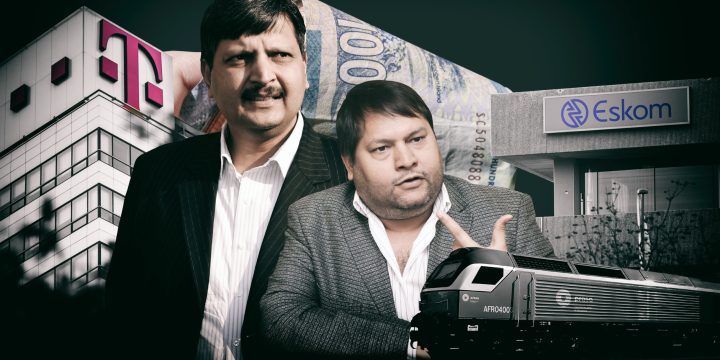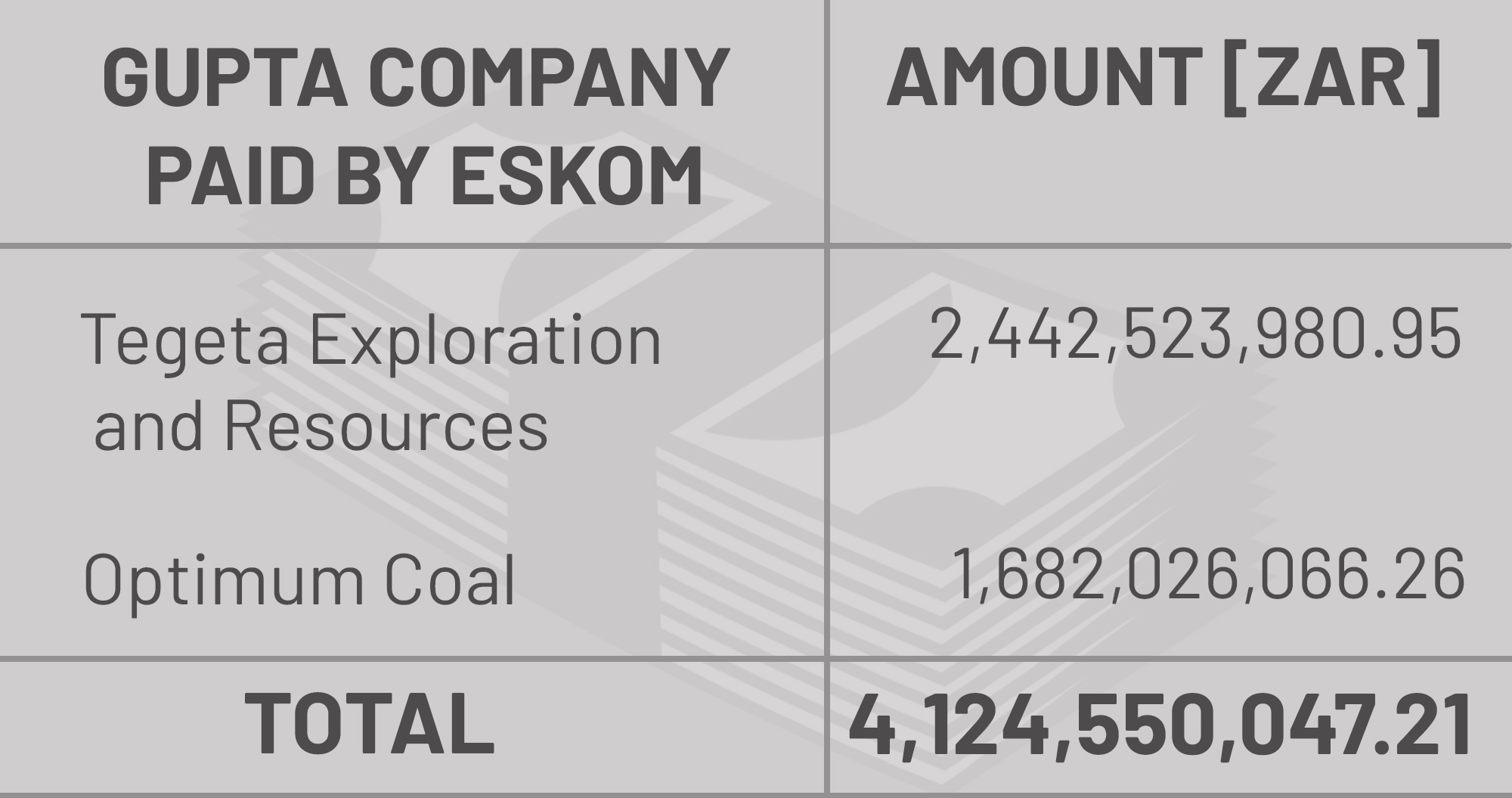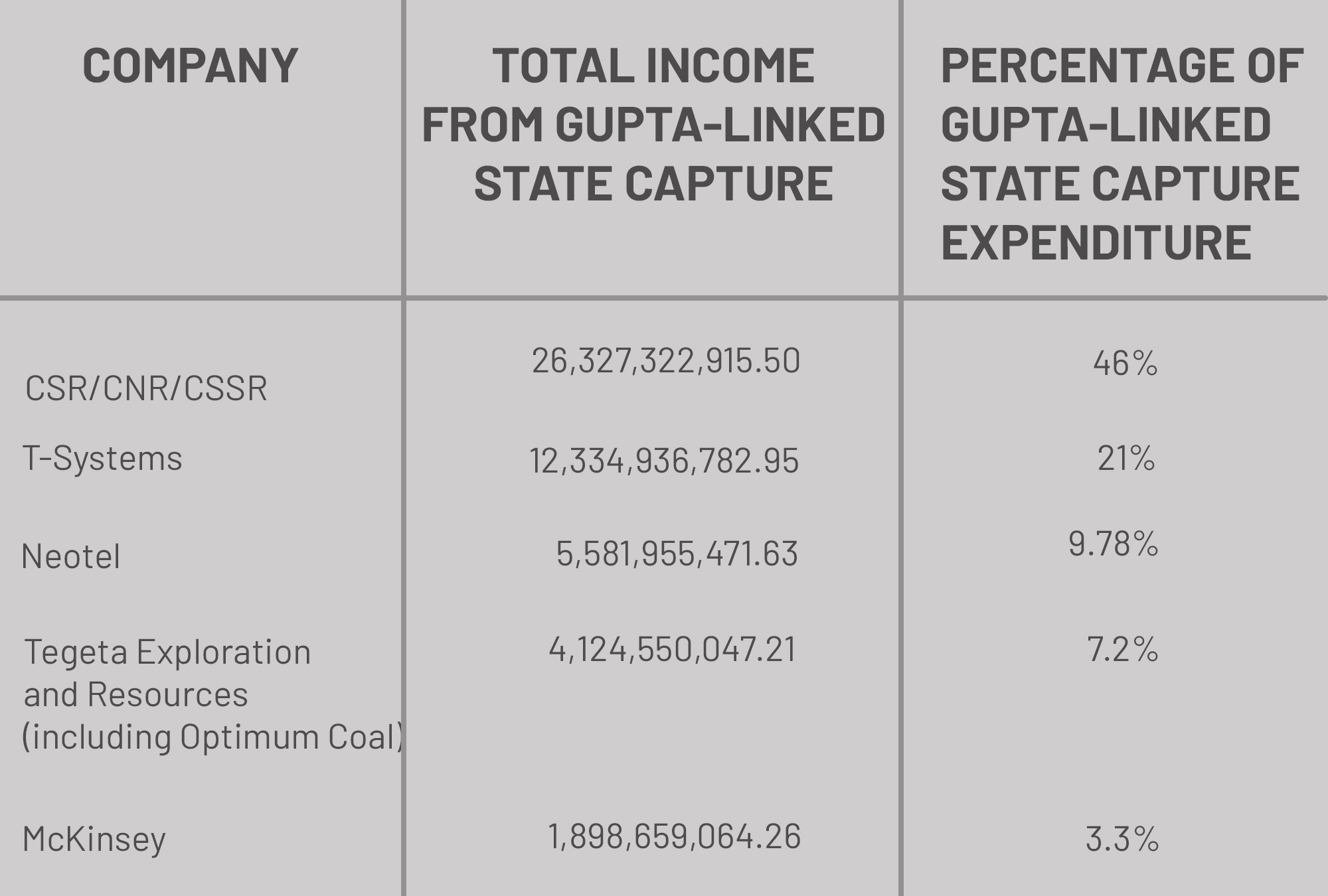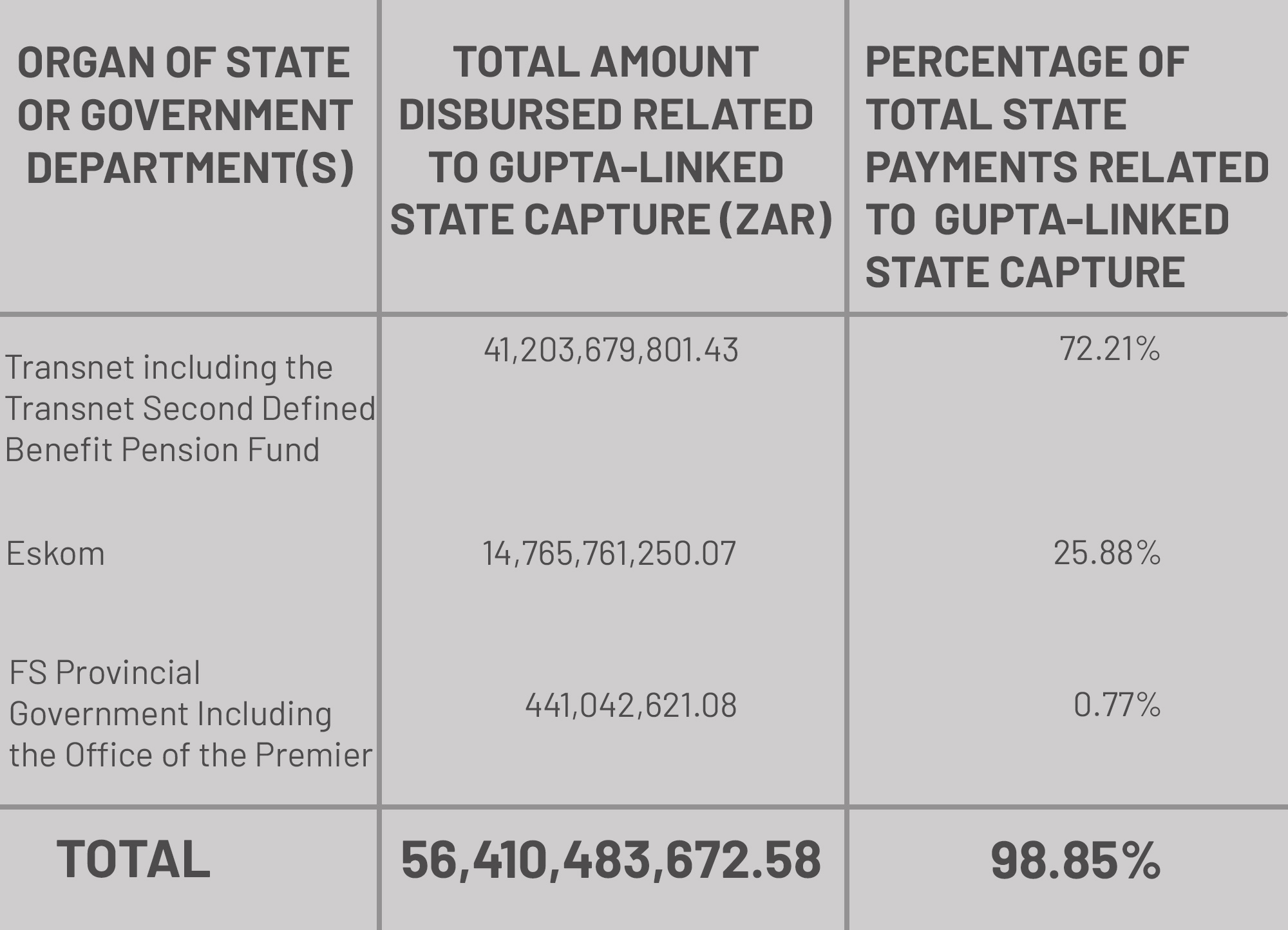THE GUIDE THROUGH SA STATE CAPTURE
Part One: What Gupta enterprise corruption cost South Africa

Over five short instalments, I will be publishing an explainer of the evidence before the Zondo Commission, working through my report from beginning to end, and pointing out some of the more incredible and outrageous stories along the way. In Part One, I will set out how much money the state paid in contracts tainted by State Capture involving the Gupta enterprise, and discuss a hitherto unknown R7.8-billion State Capture contract involving T-Systems.
Over three days in May and June this year, I gave detailed evidence to the Zondo Commission about the hard evidence of State Capture – when, where and how the money flowed to what I call the Gupta enterprise, and how much that has cost the people of South Africa.
That evidence formed part of a report running to just under 500 pages (excluding a 77-page Executive Summary). In total, my report and evidence bundle runs to 7,023 pages, including extensive banking documentation.
I am very aware that this is a lot of complicated-sounding material. But I’m also equally convinced that this material is too important to ignore.
So, over five short instalments, I will be publishing an explainer of the evidence, working through my report from beginning to end, and pointing out some of the more incredible and outrageous stories along the way.
Today, I will set out how much money the state paid in contracts tainted by State Capture involving the Gupta enterprise, and discuss a hitherto unknown R7.8-billion State Capture contract involving T-Systems.
In my second instalment, I’ll explain and enumerate how much the Guptas earned from State Capture, how I calculated this, and discuss those cases that might have slipped under the radar.
In my third instalment, I’ll talk about how the Gupta enterprise laundered their money in South Africa, and how they moved that money abroad.
The fourth instalment will look at how the Gupta enterprise’s money laundering network was used and piggybacked on existing organised criminal networks both locally and abroad.
Finally, the fifth instalment will look at how the Gupta enterprise used the criminal money they earned through State Capture to buy more assets in South Africa – assets that they then used to further loot the state. To explain this, I’ll use the example of how the Guptas purchased Optimum Coal with R1.8-billion worth of criminal money.
Before I do so, however, I want to make something clear: this research was only made possible by a team of dedicated legal and forensic researchers, advocates and deep diggers at the Zondo Commission who have been diligently collecting millions of pages of crucial banking information, following leads and money trails as far as is humanly possible.
For all the concerns about the length of time the Zondo Commission sits, it must be remembered that this process is truly, globally, unique. Nowhere else in the world right now, and possibly ever, can point to anything near the depth of investigations into grand corruption as is being pursued in South Africa.
The total cost of State Capture involving the Gupta enterprise
R57,064,461,144.82.
That is the total amount of money that the South African government spent on contracts tainted by State Capture involving the Gupta enterprise.
You may have read a different figure a month ago of over R49-billion. That figure, which formed part of my original evidence, excluded a new mega-contract that was tainted by State Capture involving Eskom and the IT supplier T-Systems. I’ll talk about that contract more below.
I calculated this figure simply: I worked with the commission to identify the contracts awarded by the South African government where they were tainted by State Capture and how much was paid against them.
This was quite a wide definition, but the essence is that the contracts involved and benefited the Gupta enterprise in some way, most notably where the Gupta enterprise eventually took a cut. In some cases – in fact, the vast majority of cases – the involvement of the Gupta enterprise was an obvious and clear predictor of some sort of irregularity in the awarding of contracts by the state.
In a small number of cases, however, the involvement of the Gupta enterprise didn’t necessarily mean that the original contract was corrupt or irregular. Instead, in the fulfilment of that contract, money flowing from State Capture was used. One example of this is the R250-million loan given by the Industrial Development Corporation (IDC) to enable the Guptas and their partners to buy Shiva Uranium. There is no evidence that the IDC made the loan irregularly. However, in paying back a portion of the loan to the IDC, the Guptas made use of money sourced from other State Capture money flows.
Two further things should be emphasised before I move on.
First, these are State Capture contracts linked to the Gupta enterprise only. They do not include, for example, the horrific looting of the Passenger Rail Agency of South Africa and many other cases of grand corruption.
Second, when I say the cost of Gupta-linked State Capture, I mean only the amount of money paid by the state in contracts. I do not calculate the opportunity cost, or the real, long-term and profound social cost of State Capture, that has included denuding the state of its abilities to realise its citizens socioeconomic rights.
But I am very confident that this amount would be orders of magnitude more than the R57-billion figure I quote above.
The five biggest earners
State Capture earned a number of companies, both multinational conglomerates and South African entities, serious money.
The contractors that received the most amount of money in State Capture related to the Guptas were China South Rail, China North Rail and the company they formed when they merged, China Railway Rolling Stock Corporation (CRRC).
These three companies were awarded contracts to deliver locomotives (and associated services) by Transnet: 95 “20E” electric locomotives, 232 “45D” diesel locomotives, 100 “21E” electric locomotives and 359 “22E” locomotives. In total, these companies were paid R26.32-billion by Transnet – 46% of the total value of all the contracts I identified that were tainted by Gupta State Capture.
In my next piece, I’ll talk about the kickbacks earned by the Guptas from these contracts – over R7-billion.
The second-biggest recipient of Gupta-related State Capture contracts was T-Systems. T-Systems is an enormous multinational conglomerate with headquarters in Frankfurt, Germany. It is a subsidiary of German giant Deutsche Telekom, which is part-owned by the German government. Deutsche Telekom reported total revenue of €101-billion in 2020.
T-Systems was awarded two huge contracts (referred to as Master Services Agreements or MSAs) to supply IT services and equipment rental to Transnet and Eskom; their connections to the Guptas is discussed below. In total, T-Systems was paid R12.3-billion. That’s 21% of the total amount paid by the state in capture contracts linked to the Guptas.
The third-highest earner was Neotel. Neotel was paid R5.581-billion by Transnet in relation to three contracts. That’s 9.78% of the total Gupta-linked State Capture tally.
The fourth-highest earner was Tegeta Exploration and Resources (TER), the Gupta enterprise vehicle that held its mining assets. In total, Eskom paid TER R4,124,550,047.21. Of this, R2.4-billion was paid by Eskom directly to TER and the remaining R1.6-billion was paid to Optimum Coal after this asset was bought by the Guptas (using over a R1-billion from Eskom to do so, as I’ll discuss in later entries).
Coming in at fifth place is McKinsey, the multinational management consultancy firm. It earned R1,898,659,064.26 in total from contracts it shared with Regiments and Trillian; R784,287,306 from Transnet and R1,108,164,558.26 from Eskom. McKinsey’s income was 3.3% of all State Capture payments connected to the Gupta enterprise.
The primary sites of State Capture
The three primary sites of State Capture, when measured against total State spend, were Transnet, Eskom and the Free State provincial government.
T-Systems and Eskom: A new mega contract tainted by State Capture
When I first presented my report to the Commission, I pointed out that I had seen that T-Systems had been making regular payments to a company called Zestilor starting in 2012, and suggested that the Commission identify the reason. T-Systems had paid R3,051,639.21 to Zestilor between August 2012 and mid-July 2015, 73.9% of Zestilor’s total income in that period.
While small in the grand scheme of things, the payments to Zestilor were particularly interesting because Zestilor was owned by Zeenat Osmany, who is married to Salim Essa, one of the Guptas’ key lieutenants. Essa was paid R501,010.10 by Zestilor between June 2012 and July 2015.
The discovery of the Zestilor payments led to another discovery: T-Systems had earned R7.8-billion through a nearly decade-long contract with Eskom that was closely linked to the Gupta enterprise.
T-Systems had first won the contract to supply IT services to Eskom in December 2009. This contract was supposed to run for five years, starting on 1 January 2010 and ending on 31 December 2015. But the contract never ended. Instead, it was extended, without competition, through a series of “modifications” – the most recent in June 2018 – that transformed a five-year contract to nearly double that length.
The repeated renewal of the contract was particularly strange as Eskom had attempted to cancel T-Systems’ contract and put it up for competitive tender. Letters from Eskom were sent to T-Systems on 26 August 2013 and 29 September 2014 making it clear that Eskom would not extend the contract and would put it out to tender. This never transpired.
On 24 June 2015, T-Systems global compliance monitor completed an internal compliance review. The compliance review was tasked with investigating T-Systems South Africa’s “non-IT consultancy agreements”.
Compliance Report by DocumentsZA
This review reveals that T-Systems opted to “informally” engage with Salim Essa (referred to as S.E) because T-Systems recognised that he “has a strong network to Eskom officials and stakeholders”.
T-Systems chose an “informal” route, rather than making Essa a formal consultant or agent, after it had started a compliance check. The compliance check included getting legal opinion on the “use of S.E. as a sales consultant – specifically the Prevention and Combating of Corruption Act”. The inference is that T-Systems quickly came to realise how problematic it would be to have Essa on-board formally, yet continued to engage with him and his allies “informally”.
Despite this, the compliance review concluded that “the decision to engage S.E. in an informal way and without any contractual basis led to a vast number of legal and compliance risks”.
The compliance report acknowledged that Essa’s “reward” for helping T-Systems with his “informal network” was that he introduced “several local and start-up companies to TSSA [T-Systems South Africa] decision makers and he requested TSSA to provide these companies with the opportunity to be included in the value chain where possible”.
No surprises for guessing who owned the “local and start-up companies” that T-Systems eventually included in its “value chain”. T-Systems made Sechaba Computer Systems its “supplier development partner” for the Transnet and Eskom contracts; the #Guptaleaks show that by 2015 it was controlled by the Guptas. Sechaba would ultimately earn R323-million as T-Systems supplier development partner.
The other “start-up” that made a fortune was Zestilor – the company controlled by Essa’s wife. Zestilor earned R238-million related to these T-Systems contracts. The bulk of this was earned when T-Systems agreed to cede the equipment rental portion of its contract with Transnet to Zestilor. Later, Zestilor would also be paid R75-million from Trillian.
Zestilor’s bank statements show it was largely a front for Sahara. Of R319-million paid to Zestilor in relation to the T-Systems and other contracts, 95% was paid onwards to Sahara Computers. Sahara was thus paid R302-million by Zestilor between May 2015 and September 2017.
The real kicker is how the T-Systems compliance audit ended. Despite the obvious quid pro quo between T-Systems, Essa and Gupta companies, the report concluded that the relationship between T-Systems, Sechaba and Zestilor was a “normal contractual relationship in place without any irregularities. There is no indication of corruption or any other illegal behaviour”.
And so, despite everything that would become known about Essa, Zestilor and Sechaba, T-Systems’ group compliance department gave T-Systems the green light to keep doing what it was doing.
Coming up next
In the next instalment, I will explain how the Gupta enterprise earned at least R16-billion from State Capture – creaming 28% from the total payments made by the state in cases involving the Guptas, and highlight some of the most egregious and lesser-known cases where the family made its mark. DM
























 Become an Insider
Become an Insider
Is the cost of state capture associated with the Guptas not the difference between R57 billion and the amount that would have been paid had each contract been properly procured following a legitimate competitive bidding process? Assuming for these purposes that each of these contracts were for goods and services needed by the various organs of state and would have been procured regardless of state capture, there would have been a cost associated with this. Transnet, for example, would still have procured locomotives from a supplier, but at a lower price than what was paid. The cost of state capture in respect of that contract would therefore be the amount by which R26 billion exceeds the amount that would have been paid had a proper process been followed, rather than the full R26 billion. Transnet did receive locomotives; due to state capture, though, the cost of the locomotives was higher than it ought to have been. Regarding T-Systems, the involvement of the Guptas resulted in its contract being unlawfully extended, the consequence being that Eskom paid a higher price for its IT services than it would have paid had it put that contract out to tender at the end of five years. The state capture cost would the excess amount, not R7.8 billion.
The direct cost of state capture is effectively the amount that would not have been paid if these various contracts had been properly procured i.e., to use the technical term for it: money for jam.
You are correct, but without testing the market, any figures would be thumb-sucks, so I am comfortable with the approach of using the overall figures. Unfortunately, some contracts were so over-inflated, that the overall figures are probably close to the actual amounts lost.
Bradley, it looks to me that your concerns will be addressed over the five part series. In any event, it looks as though plenty of homework has gone into this.
I agree, the only way to test the market is by doing the procurement properly in the first place. Also, as I said tis would be the direct cost only. The indirect costs would include those attributable to not getting the best suppliers for the contracts, the cost of repairing or maintaining sub-standard work, the loss of skills-transfer etc. These costs are unquantifiable at this stage and may have longer-term effects than the simple overpayments. It is so sad.
this is of course assuming that all the contracted delivery items were “necessary”. In any cases where not, the total cost would apply regardless.
Although this is a valuable analysis, like most authors of similar articles Holden buys into the ANC’s nonsensical construct of ‘State Capture’ that, along with the Zondo Commission has been designed to deflect guilt away from the ruling party on to the companies and individuals that benefitted from ANC corruption. We vote governments in to protect us from criminal activity across the board – and this includes white collar crime. Not only did the ANC fail in its duty to do this, it actually facilitated the rampant pillaging. It’s high time for the educated, informed, intelligent individuals who write these articles and appear on various media to stop tip toeing around the ANC and have the courage to put the blame of “State Capture” firmly in the lap of the ANC government and call it what it is, State Corruption, pure and simple.
You absolutely right. The ANC are quite clearly complicit as enablers in this whole affair. Not only did the party benefit, but so did individual members of the ANC. Look at this guy Kodwa at Zondo today, claims he was in financial difficulty so takes a no strings attached “loan” from a “friend” of R1 million, but spent R850K of it buying a car.
I would wait for the report from DCJ Zondo. While People like Malusi, Moyani, Molefe, ANC …… have been to the commission and spun their yarn, the real action must happen when the report is released. Therein lies the truth.
The issue of concern is the release of the report is very close to the next ANC conference – would Ramaphosa act on the report or let it rot for a few months. Pie is best eaten hot.
I agree with Keith 100%. This whole saga is anc state corruption. The only reason why it is ‘out there’ is because some anc member was stupid enough to be caught, not because they want to put a stop to it. Just look at gwede and the Karpowership ’emergency’ 20 year contract.
correct, if a contract or non existent service was required in the 1st place.
Paul’s expose reads like a nefarious work of fiction. South Africans owe an immeasurable debt of gratitude to the investigative journalists, auditors and attorneys who, no doubt, work under difficult and threatened conditions. Without their courage, professional expertise and dogged determination, South Africa would have slipped in an abyss of crime and corruption from which it could not have recovered. The entire country would have been captured. We salute you,
Yes, indeed. Another salute here too!
Another salute!
And another!
Hard hitting, in my experience there is nothing more unreliable than an audit. IRBA ought to address but I doubt IRBA has the capacity or capability left to deal with this matter.
The real cost of the ‘state capture’ is not so much the billions that were stolen. The real loss is the skills SA lost and continues to lose through emigration. Those skills will never come back to the country and are lost forever.
Those skills are what SA so badly needs if we want to get out the #%$#% we are in. The loss of those skills create trillions of losses for SA.
Well said – the skills driven away by the utter incompetence of government and the failure criminal justice system as well as the opportunity cost of the development forgone are the real issues.
So true Etienne.
Etienne is bang-on correct. South Africa’s most valuable export: it’s human capital. Under this current government we are educating our children for export. Perverse, to say the least.
As I’ve said before, I will only start trusting the efficacy of these CoE’s when we actually see those people fingered in these reports jailed. In the meantime the looting machine continues unabated so clearly those stealing state money are not the least concerned about being exposed. I’m starting to wonder is there’s not something else at play.
Either wrongdoing is punished, when discovered, and in the case of public servants, punished more heavily than in the case of ordinary individuals, or it will continue.
Do you think a thief should get a shorter sentence than a policeman or judge caught thieving?
Personally I do, as there is misuse of office to add to the simple theft.
Why is Zuma not in prison, or Magashule, or the rest of them? In prison, awaiting trial, as you or I would be if caught committing a theft.
Worse still, to my mind, and I am not a South African, just a swallow, is that for every million Rand one could build twelve homes for the homeless, of whom there are far too many here in SA.
For the money these buggers have stolen, a further 700,000 houses could have been built.
There, to me, is the real crime – pronouncing that they are working for the poor, whilst thieving the money the desperately poor desperately need.
Exactly. They commit two crimes, the second being deliberate injury to mandates they get paid for to uphold the constitution. These hidden costs are always borne by the poor and the future generation, and the actual cost is escalated.
Ghank you. This is necessary in our environment.